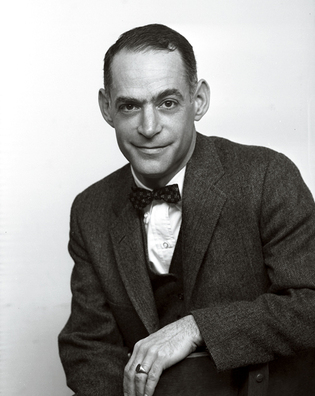 loading
loading
MilestonesRemembering John Morton Blum Manuscripts & ArchivesHistory professor John Morton Blum, who died on October 17, in a photo from 1957. View full image
John Morton Blum, Sterling Professor of History Emeritus, died on October 17, just as our last issue was going to press. We reported on his death, but until now couldn’t report (in print) on what followed: an outflowing of obituaries and tributes that drew a portrait of a well-loved teacher and admired scholar. —The Editors
In The Republican Roosevelt, Professor Blum argued that Theodore Roosevelt had reinvigorated a presidency that had been in decline since the Civil War. … Though that view is accepted now, Roosevelt’s presidency, from 1901 to 1909, was considered mediocre at the time, partly because he had not led the country in war. He was portrayed by many as a buffoonish caricature of a national leader. … Professor Blum argued that, in fact, Roosevelt’s genius for governance established a model for Wilson and Franklin Roosevelt as well as all the others who followed him.
I would argue the hallmark of his career was his three-volume summation of [Henry] Morgenthau’s tenure as Treasury Secretary, From the Morgenthau Diaries. … Blum combed through and helped to organize the Morgenthau Diaries and transformed them into a three-volume history, often interviewing Morgenthau himself to gain perspective. This decade-long work is absolutely essential to anyone delving into the Morgenthau story.
Wearing tweed jackets and bow ties, uttering beautifully formed sentences seemingly without forethought, Blum struck his disciples in the 1980s as a classic Ivy League type. … Some years later, after becoming a historian myself, I read A Life with History (2004), Blum’s autobiography. It was a revelation. For one thing, I learned that Blum was Jewish—a fact that, given his name, should have been perfectly obvious yet was somehow obscured by his tweedy aura. … A Life with History also revealed how much Blum’s schooling—first at Andover, then at Harvard—transformed him, imbuing him with the Ivy style that by the 1980s seemed intrinsic to his identity.
One week Professor Blum asked for two students to help rake leaves. I jumped at the chance to experience more of what Yale was all about. I raked leaves with another student for a few hours. Professor Blum talked with us a bit and served us lunch. But the most amazing thing was that he had a visitor just stop by for lunch, an older gentleman who introduced himself as Kingman Brewster!
He often appeared on television documentaries, but his most unusual screen performance came in 1983 when he had a cameo in the Woody Allen film Zelig, discussing the fictional title character’s ubiquitous presence at major events of the 20th century. “He wasn’t much of a moviegoer,” his son said Saturday. “It took him a while to realize Woody Allen was on the phone. He thought it was one of his students playing a prank.”
Thirty years after I sat through a semester of lectures on the Progressive Era, and one of the longest final exams that I ever wrote, I still have detailed and lasting memories of John Blum: his Theodore Roosevelt imitation, his holding forth at lunch with students, a healthy dose of pomp during one-to-one chats in his office, and above all the wisdom imparted during a brief vivid encounter with the man, his bow tie, and his pipe as I exited SSS 114 after writing that exam and headed into a snowy, dreary New Haven. I thanked the man for the course, and I shared the wish that I could remain an undergraduate for more than the standard four years, so that I could take all of the provocative courses in what was then the Blue Book—the Yale course catalog. No, you don’t want to stay, Blum replied; four years is plenty of time to devote to college. After that, you should go exploring.
The comment period has expired.
|
|